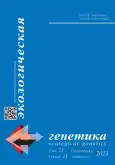Third International Conference “Genetically modified organisms: the history, achievements, social and environmental risks”
- Authors: Matveeva T.V.1
-
Affiliations:
- Saint Petersburg State University
- Issue: Vol 21 (2023): Спецвыпуск
- Pages: 4-4
- Section: Genetically modified organism. The Нistory, Achivements, Social and Environmental Riscs
- Submitted: 08.09.2023
- Accepted: 09.09.2023
- Published: 04.12.2023
- URL: https://journals.eco-vector.com/ecolgenet/article/view/569179
- DOI: https://doi.org/10.17816/ecogen569179
- ID: 569179
Cite item
Full Text
Abstract
Third international conference “GMO: history, achievements, social and environmental risks” was held on October 3–5, 2023 in Saint Petersburg State University, Saint Petersburg, Russia in mixed format (on-site and on-line). The conference was attended by researchers from Russia, China, Germany, Spain, India, Moldova, Tadjikistan, Belarus. They discussed new genetic engineering methods, promising results and their promotion in society. A lot of interest was attracted to the sections devoted to the genome editing of various organisms and genetic engineering in agriculture. A number of reports aimed to study the fundamental problems of biology and medicine using genetically modified microorganisms and animals. The whole section was traditionally devoted to environmental studies, involving transgenic organisms, natural GMOs that arose without human intervention. Discussion of society’s attitude towards GMOs concluded the conference, where the importance of improvement of GMO diagnostics, as well as closer interaction between biologists and lawyers for improving legislation in the field of GMOs was noted.
The conference was held with support of the Ministry of Science and Higher Education of the Russian Federation in accordance with agreement No. 075-15-2022-322 date 22.04.2022 on providing a grant in the form of subsidies from the Federal budget of Russian Federation. The grant was provided for state support for the creation and development of a World-class Scientific Center “Agrotechnologies for the Future”. The conference organizing committee expresses gratitude to the sponsors: companies Helicon and Synthol.
Keywords
Full Text
Third international conference “GMO: history, achievements, social and environmental risks” was held on October 3–5, 2023 in Saint Petersburg State University, Saint Petersburg, Russia in mixed format (on-site and on-line). The conference was attended by researchers from Russia, China, Germany, Spain, India, Moldova, Tadjikistan, Belarus. They discussed new genetic engineering methods, promising results and their promotion in society. A lot of interest was attracted to the sections devoted to the genome editing of various organisms and genetic engineering in agriculture. A number of reports aimed to study the fundamental problems of biology and medicine using genetically modified microorganisms and animals. The whole section was traditionally devoted to environmental studies, involving transgenic organisms, natural GMOs that arose without human intervention. Discussion of society’s attitude towards GMOs concluded the conference, where the importance of improvement of GMO diagnostics, as well as closer interaction between biologists and lawyers for improving legislation in the field of GMOs was noted.
The conference was held with support of the Ministry of Science and Higher Education of the Russian Federation in accordance with agreement No. 075-15-2022-322 date 22.04.2022 on providing a grant in the form of subsidies from the Federal budget of Russian Federation. The grant was provided for state support for the creation and development of a World-class Scientific Center “Agrotechnologies for the Future”. The conference organizing committee expresses gratitude to the sponsors: companies Helicon and Synthol.
About the authors
Tatiana V. Matveeva
Saint Petersburg State University
Author for correspondence.
Email: radishlet@gmail.com
ORCID iD: 0000-0001-8569-6665
dr. sci. (biology), professor, department of genetics
Russian Federation, Saint PetersburgReferences
Supplementary files










